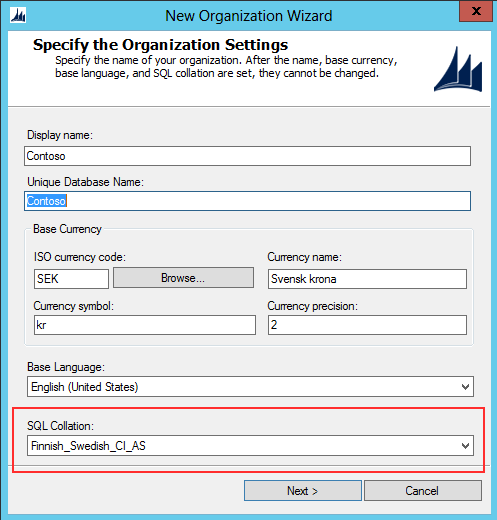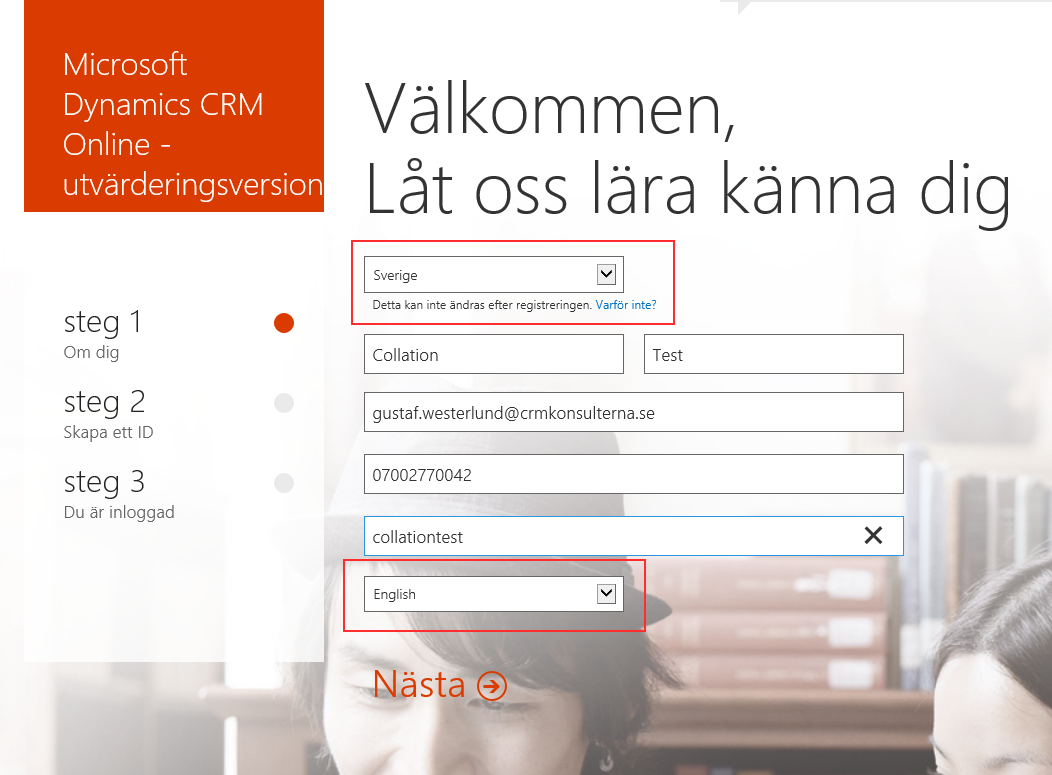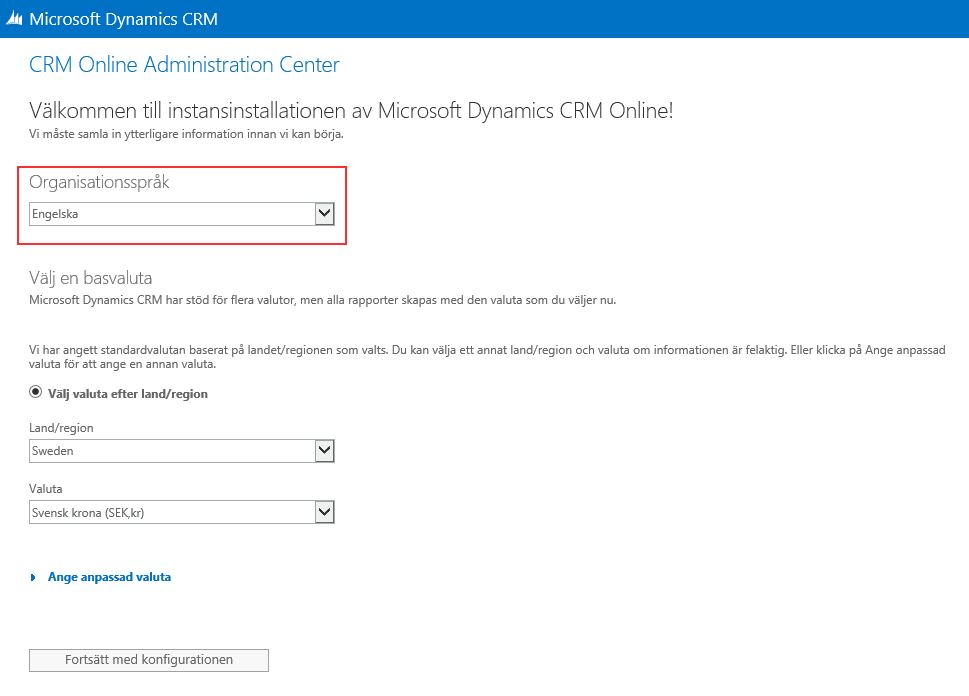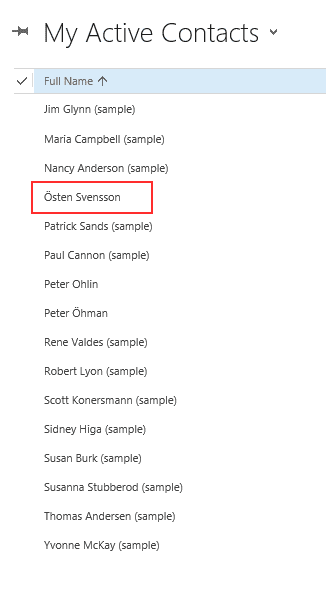
by Gustaf Westerlund | Jul 3, 2014
When working with CRM systems in non-English countries you often need to take certain aspects into consideration that might have very dire consequences if set incorrectly, one of these is the database collation.
The collation of the database is simplified how it orders characters. For those of you not used to working with multi-language installation with odd characters this might not be something you have considered. As I am Swedish let me give you an example. The Swedish alphabet looks as follows:
abcdefghijklmnopqrstuvwxyzåäö
However using the collation that is default when using English as language in an on premise installation, which is “Latin1_General_CI_AI” (CI= Case Insensitive, AI = Accent Insensitive) the Swedish alphabet would be sorted as follows:
aäåbcdefghijklmnoöpqrstuvwxyz
This is why when installing an organization that is to be used in Sweden, despite the fact that you might have chose to have English as base language, that you need to select the collation that sorts the Swedish characters correctly which for CRM is “Finnish_Swedish_CI_AS”.
 |
On-premise setup of CRM – ability to select Finnish_Swedish_CI_AS collation
despite using English as base language |
When setting up an organization in CRM online, you cannot chose the collation explicitly which is regrettable and I hope there will be some advanced setting in the future which will allow for this when provisioning new organizations. Check out what happened when I provisioned a new organization in English indicating that I was in Sweden.
 |
| The first pick list is for country – I selected “Sweden”, the last is for language and I changed from “Swedish” to “English”, which were the two only options. |
After going through all the three steps you are shown a last instance configuration step.
 |
| In the instance configuration screen you can select the base language but there is no selector for collation. I selected “Engelska”, which if you have any imagination, means “English”. |
After, a few seconds, yes, the new installation process is great and really fast, my org is up and running and I jump in to contacts and create to contact and check out the sorting. Any bets?
 |
| As you can see selecting English language will also implicitly select Latin1_General _CI_AI as collation which is incorrect from a Swedish perspective, I would have liked to see Östen Svensson at the end of the list, not sorted as “O”. |
Collations are integral to the configuration of the SQL database and there are many features of the database like ORDER BY and indexes that depend on the collation why changing collation of a database is very very tricky. It is actually so tricky that it is not supported if you manage to do it with an on-premise, which I have heard rumours of that some people have managed to do. On an online you cannot request it. You will be recommended to migrate the data from the old org to the new.
So let’s hope Microsoft will enhance the provisioning experience for CRM Online so that it includes a selector for collation. In the meantime, if you need a special setup, like the one I tried to set up above, English with Finnish_Swedish_CI_AS collation on CRM online I would suggest contacting Microsoft Online support to get their assistance in setting up the instance correctly. Hopefully they can assist in this.
And on another note, I was awarded the MVP award for the third year! A great honour and this very article is dedicated to the very award as two of my fellow MVP:s Shan McArthur and Niel Benson provided with background information to this article. I extend to you a humble thanks!
Gustaf Westerlund
MVP, CEO and owner at CRM-konsulterna AB
www.crmkonsulterna.se
by Gustaf Westerlund | Jun 24, 2013
If you have been reading my blogs previously you might have noticed that I several times (More on the insecurity of data, External posting on if your cloud system is safe from the law) have written about the fact that I think that many companies are viewing clouding a bit too lightly, especially from the legal perspective that many countries governments perceive themselves of having the rights to your data if the data either resides in that country, travels through that country or is owned by a company in that country.
From this perspective, I must conclude that the Snowden case is not very surprising. It mearly confirms what I expected to be true all the time and I would say that anybody being surprised is rather showing exceptional naivety towards our governments.
Hence I would just again remind you, that if you have sensitive data, beware of all the threats to the data. There are hackers, lawyers, FBI agents, and XYZ-agents and you have to assess the interest of all potential parties to you data. Then understand and handle the risk in a controlled manner.
Gustaf Westerlund
MVP, CEO and owner at CRM-konsulterna AB
www.crmkonsulterna.se
by Gustaf Westerlund | Jan 29, 2013
As I previously discussed in a guest posting at Software Advice, the legal aspects of cloud computing are interesting and an article recently in “Computer Sweden” (Swedish) again raised this issue with references to the law at hand in the US.
The article references the law Foreign Intelligence Amendments Act, FISAAA, and describes how it can be used without any court order or by-case permits required. According to the interpretation of the law it has some limitations but can rather freely be used to gather non-american data. It does not have to be political data, but can just be data from a forign region affecting US foreign affairs.
As it does not require case-by-case permissions, the interpretation of the law is probably handled quite far down the ranks were this is deemed necessary. The interpretation could hence also be quite wide and I would not be surprised if data such as defence industry business opportunities fall within this area and probably other related areas. Foreign affairs is a wide definition, automobile export, telecomunication equipment and software export is defintley within the boundaries.
I would hence, strongly advice against putting data in countries with legislation similar to this (USA is definetly not the only country). When using the Microsoft Dynamics CRM Online service in Europe, the case is a bit better as the data is stored in countries within the EU:s juristiction. The US law is, however, interesting in this part as it focuses on the companies being american and not where the data is actually stored. Hence, the fact might be that the US government might be able to push Microsoft/SalesForce/Google or any other american cloud systems supplier into handing over data backed up by this law even if the data is stored in other countries.
To be on the safe side, from the legal aspect, storing the data in your own servers run by your own people, is always the safest. Their loyalty lies with your company and you have control over the physical storage of the data. Do not that this, however, is no safeguard agains hackers.
Gustaf Westerlund
MVP, CEO and owner at CRM-konsulterna AB
www.crmkonsulterna.se






Recent Comments